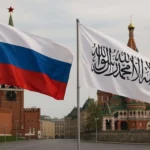Pakistan, a nation with a distinguished history of resilience and solidarity, is once now confronting a covert assault aimed at undermining its stability. This recent upheaval is not spontaneous but a calculated and coordinated endeavor by external entities, primarily India, to incite disorder within our territory. This effort is fundamentally rooted in the fitnah of the Khawarij, a hardline faction that, under the pretense of reform, promotes foreign interests aimed at fragmenting Pakistani society.
Recent findings have unveiled incontrovertible proof demonstrating direct Indian assistance for the FAK (Fitna al-Khawarij) network. This organization, shrouded in pseudo-intellectualism and deceptive notions of justice, is essentially a proxy entity supported by Indian intelligence services. Their aims are explicit: to disseminate discontent, challenge national institutions, and ultimately incapacitate Pakistan’s democratic and security framework. India’s utilization of such groupings is neither novel nor unexpected. For decades, Indian agencies have utilized analogous strategies, financing, training, and providing refuge to anti-state actors, to subvert Pakistan’s sovereignty.
The revival of Khawarij ideology in Pakistan is not a mere theological or intellectual coincidence. It is an externally financed initiative disguised as a local discontent. The contemporary Khawarij, akin to its historical counterparts, advocate extremism, insurrection against legitimate authority, and endeavor to fragment Muslim societies. Their arsenal comprises not just violence but also deception, a hybrid warfare strategy designed to bewilder the youth, undermine national unity, and erode the trust between the populace and the government.
In recent months, there has been a concerning rise in antagonistic discourse aimed at Pakistan’s political leadership and fundamental state institutions. These occurrences are not isolated but rather components of a broader narrative conceived overseas and implemented by local accomplices. The aim is explicit: to undermine the democratic system, cultivate distrust among the populace, and provoke insurrection under the guise of reform and justice. These activities are in complete accordance with India’s enduring strategy of undermining Pakistan internally. India has persistently attempted to depict Pakistan as unstable and fragmented, whether by sponsoring terrorist networks in Balochistan or engaging in global misinformation efforts, a picture that is far detached from reality.
Notwithstanding these endeavors, the populace of Pakistan has persistently demonstrated exceptional solidarity during crises. The military, intelligence organizations, judiciary, and civil society are unified in their objective to maintain national integrity. The nation has endured numerous crises historically, ranging from foreign invasions to domestic terrorism, and has emerged more resilient on each occasion. The present threat, despite its skilled implementation, will not be an exception. The Fitna al-Khawarij may utilize social media and digital channels to disseminate their falsehoods, nevertheless they cannot undermine the longstanding connection between the populace and the Pakistani state.
This current conspiracy is distinguished by its mixed nature. Instead of direct military engagement, Pakistan’s adversaries increasingly depend on psychological warfare, misinformation, and proxy organizations such as FAK to fulfill their objectives. These approaches are insidious yet perilous. They seek to undermine society’s moral compass, portraying traitors as heroes and terrorists as victims. However, the populace of Pakistan is no longer readily misled. The obscurity has been dispelled, revealing the truth: this is not an internal contest for rights or justice; rather, it is an outside instigated endeavor to undermine the unity and tranquility of Pakistan.
It is essential, now more than ever, for every Pakistani, irrespective of political allegiance, nationality, or sect, to acknowledge the peril presented by these contemporary Khawarij. Historical evidence illustrates the catastrophic repercussions of remaining mute in the presence of such discord. Our faith, our constitution, and our national interests necessitate that we face and reveal these components without delay. This responsibility extends beyond the government and military to encompass every citizen who cherishes this nation and is invested in its future.
The fortitude of Pakistan is rooted in the indomitable spirit of its populace. We have vanquished terrorism, withstood external pressure, and surmounted catastrophic natural calamities. Today, we confront a distinct adversary – one that functions covertly and assaults our cognition and convictions. Nonetheless, Pakistan will ultimately triumph. The cohesion of our institutions, the lucidity of our goal, and the resoluteness of our citizens guarantee that no foreign conspiracy, regardless of its sophistication, can undermine the essence of our nation.
This is a warning to Pakistan’s adversaries: your schemes will falter, your proxies will be unveiled, and your deceptions will be dismantled by the force of truth and the might of unification. The Pakistani nation remains united, resolute, and fearless. The turmoil of the Khawarij will be vanquished, akin to all other threats to our sovereignty, through bravery, determination, and confidence in Allah.







